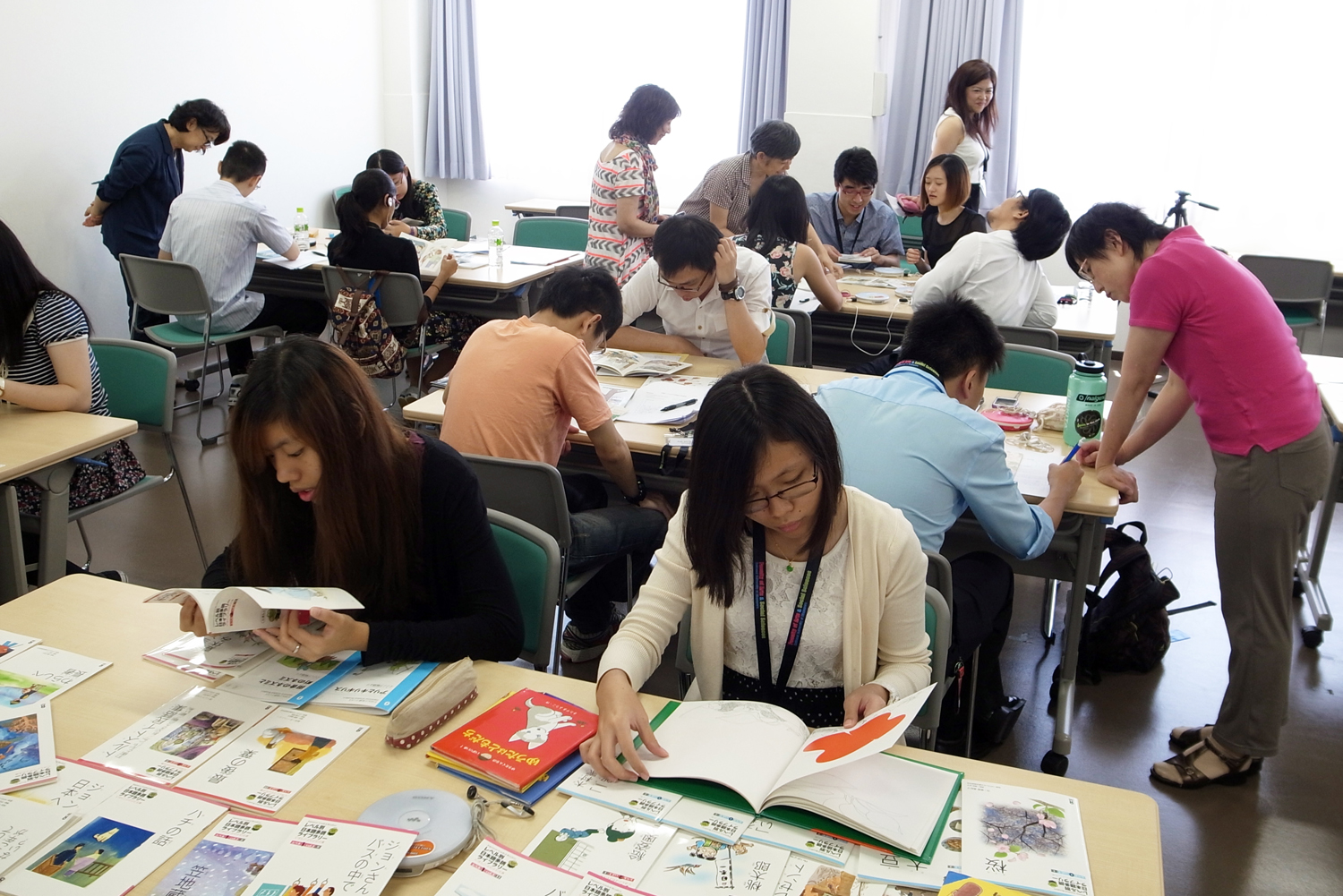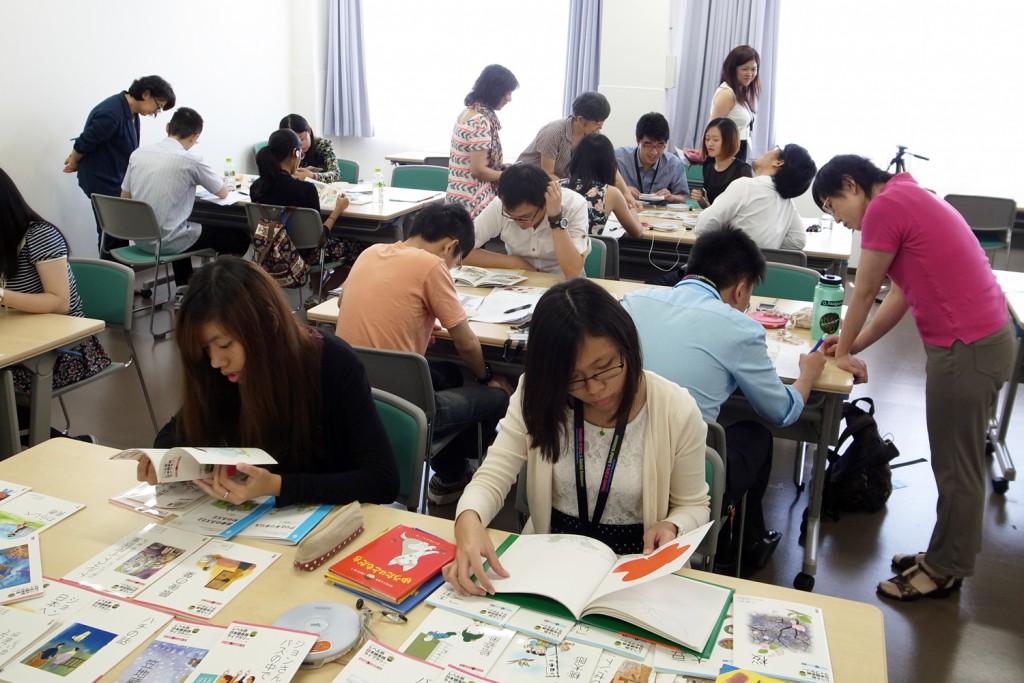7月11日(金)のシンガポール大学のみなさんとの多読ワークショップは、多読クラス授業に飢えている?私たちにとって、いまだに興奮さめやらぬ素敵なセッションとなりました。
さて、そのときみなさんにアンケートに答えてもらいました。ちょっと驚いたのは、「本を読むことは好きですか」という問いに、全員が、好き、または大好きと答えていたことです。これまでの経験では、20名いたら2,3名は「ほとんど読まない」「あまり好きじゃない」と答えるのですが・・・。確かに、みなさんの本に向かう姿勢は、すばらしかった!
以下に、「多読の読み方について思ったこと」と「今日の感想」をほぼそのまま掲載しました。
入門者でもいっしょうけんめい、日本語を使おうとしているのがわかります。英語で書かれたコメントもぜひ、読んでみてください。「多読」についてごく簡単な説明しかしなかったのにもかかわらず、深い理解が伝わってきます。
回答者の学習歴の内訳は次の通りです。
11名 2または3週間
7名 1年~1年半
2名 5年以上
ーーーーーーーーーーーーーーーーーーーーーーーーーーーーーーーーーーーーーーーーー
 ★「多読」の読み方について、どう思いましたか。
★「多読」の読み方について、どう思いましたか。
・すごい。
・おもしろい。
・いい読み方だと思います。本をはやく読むことができます。
・たのしかったです。 I picked up some new vocabulary from the books so I feel this is a good way to encourage students of the language.
・It is a great institution as it allows people with many different background and Japanese language skills to learn more. This can develop our Japanese reading and comprehension skills further.
・Tadoku enhances our learning by providing books that matches our current proficiency level. Through reading, we are able to learn new vocabulary and see how the vocabulary we already know is being used. Tadoku has a unique perspective towards learning—active learning instead of rote learning off textbooks.
・Interesting; enriching; good method of learning Japanese.
・Interesting and different from usual language learning.
・It is very effective in helping me learn. More importantly, it is making learning Japanese much more enjoyable and faster.
・Tadoku gives me a very interesting perspective on my study and reading. It is a very effective and very enjoyable experience. I would like to continue on Tadoku in my further study in the Japanese language.
・Very interesting and it helps me improve my Japanese in a fun way.
・とてもおもしろくて、読むことがたのしくて、やさしいになりました。本からたくさん日本のぶんかに習いました。
・ It’s a stress-free way of practising and learning a language I am unfamiliar with.
・It teaches an new and interesting method of learning a new language; breaking previously established conventions of referring to the dictionary whenever on encounters an unknown word but instead to look at the picture to figure out the meaning on your own. By doing so, we are able to build a better association between the words and the images they represent, thus remembering the word for a longer period of time.
・大学で読む資料が多いので、「多読」の読み方は役に立つと思います。
・外国語の勉強に役立つ読み方だと思います。辞書を引かないで読み続けると、段々本を読むことが面白くなっていく感じがします。(でも、一冊読み終わった後、ちゃんと知らない単語を調べるのも大事だと思います)
・こんな学習方法は日本語を初めて勉強する人はとてもいいと思いますが、JLPT(日本語能力)試験のために言葉や文法や覚えなければなりません。
★今日の感想を書いて下さい。
・色々な本が読めて、面白かったです。
・とても楽しい一時間を過ごすことができました。いつも忙しくて、あまりリラックスの状態で本を読む時間がないからです。
・たのしかったです。もっと読みたいです。Japanese Folktales are very interesting.
・本は全部とてもおもしろいです。
・もっと時間がほしいです。
・今日はとても嬉しかったです! 本を沢山読みました。
・あたらしのexperience. A unique and interesting experience in learning a new language.
・I learnt a lot though reading so many interesting books. I think it encourages me to study Japanese harder when I can understand these Japanese words.
・It was fun to read the books made by the teachers at Tadoku. The teachers were very patient.
・Tadoku is an interesting experience. It made learning new Japanese words fun and easy.
・Today is the day that makes my reading so happy!
・i felt happy and accomplished to find myself being able to understand the storybooks in the Japanese language.
・Thank you for such a good experience with many interesting books.
・Singapore needs to stock more easy-to-read Japanese books.
・I enjoyed myself a lot. It was like learning a new language when I was young, which make me feel like a curious child once again, so thank you very much for bringing joy into my life!
・I like the Japanese Graded Readers Series books. They teach me many Japanese general knowledge.
・It is still a bit hard for me to understand all the sentences in the books, but I can briefly understand the content.
(粟野)
